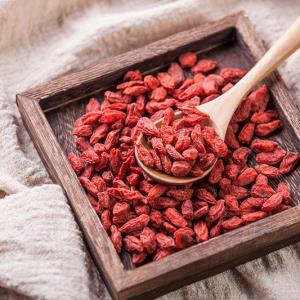Adherence to a healthy dietary pattern for 16 weeks coupled with wolfberry intake led to characteristic alterations to the plasma lipidome in middle-aged and older adults, a study from Singapore reveals.
Looking at the correlations between plasma lipidome and cardiovascular disease (CVD)-related risk factors, total cholesterol had a marked positive correlation with 13 ceramide species, while high-density lipoprotein-cholesterol (HDL-C), which was notably increased with wolfberry intake, had a positive correlation with 10 phosphatidylcholine species.
Changes in oxidative stress status (ie, plasma 8-isoprostanes) was positively correlated with lipidomic triglycerides and ether-triglycerides (41 species) but negatively correlated with hexosylceramides (eight species) and sphingomyelins (six species). [Front Nutr 2024;11:1258570]
“An examination of these fluctuations suggests potential biochemical mechanisms that may mediate the antioxidant and CV protective effects of healthy dietary pattern adherence and wolfberry intake,” the researchers explained.
Without wolfberry intake
After the 16-week intervention period, there were also significant changes for 50 lipid species across both study arms. The researchers noted that these changes were likely a consequence of compliance to the healthy dietary pattern independent of wolfberry intake.
Week 16 saw markedly higher concentrations of 24 and 33 triacylglyceride species in the respective groups of individuals who did and did not consume wolfberry compared with baseline.
“The increases in concentrations of several triacylglyceride species evident across both groups were likely contributed by dietary changes following adherence to a healthy dietary pattern. Dietary alterations, especially to the type of fat consumed, may elicit a direct effect on the fatty acid profile of circulating triacylglycerides,” the researchers said. [Mol Nutr Food Res 2014;58:1873-1882]
Beneficial vascular outcomes
Wolfberry is a known food consumed historically in Asia containing several bioactive components, including carotenoids, phenolics, prebiotic polysaccharides, and vitamin C precursor, which may modulate CVD risk. It is also the richest source of zeaxanthin among all foods. [Life Sci 2004;76:137-149; Phyther Res 2007;21:1020-1024; World J Gastroenterol 2012;18:5351-5359]
Evidence reflects the potential of wolfberries to generate CV benefits, such as improvements in HDL-C concentration and oxidative stress status, inhibition of lipogenic genes, and reduction of circulating triacylglyceride levels. [Am J Clin Nutr 2021;114:80-89; Antioxidants 2021;10:567; Sci Rep 2016;6:36209; Nat Commun 2016;7:12180]
“Long-term wolfberry intake as part of a healthy dietary pattern was recognized to have beneficial vascular outcomes … Nevertheless, limited studies examined blood lipid changes in detail and the potential mechanisms that underlie the observed CV protective benefits,” the researchers noted.
To characterize alterations to the plasma lipidome in middle-aged and older adults, the team conducted a 16-week study (from July 2018 to October 2019) at the National University of Singapore and National University Hospital. Thirty-eight participants (mean age 55 years, 76 percent women) were provided dietary counselling and were instructed to consume or not consume 15 g of wolfberry daily.
“The present research deduced characteristic alterations to the plasma lipidome following an adherence to a healthy dietary pattern, and with wolfberry consumption,” said the researchers.
“[The] fluctuations represent both the cellular and biochemical changes that follow the dietary intervention and illustrate the downstream lipidomic alterations that may mediate the role of wolfberry in raising HDL levels and in maintaining the antioxidant network for CVD prevention,” they concluded.

